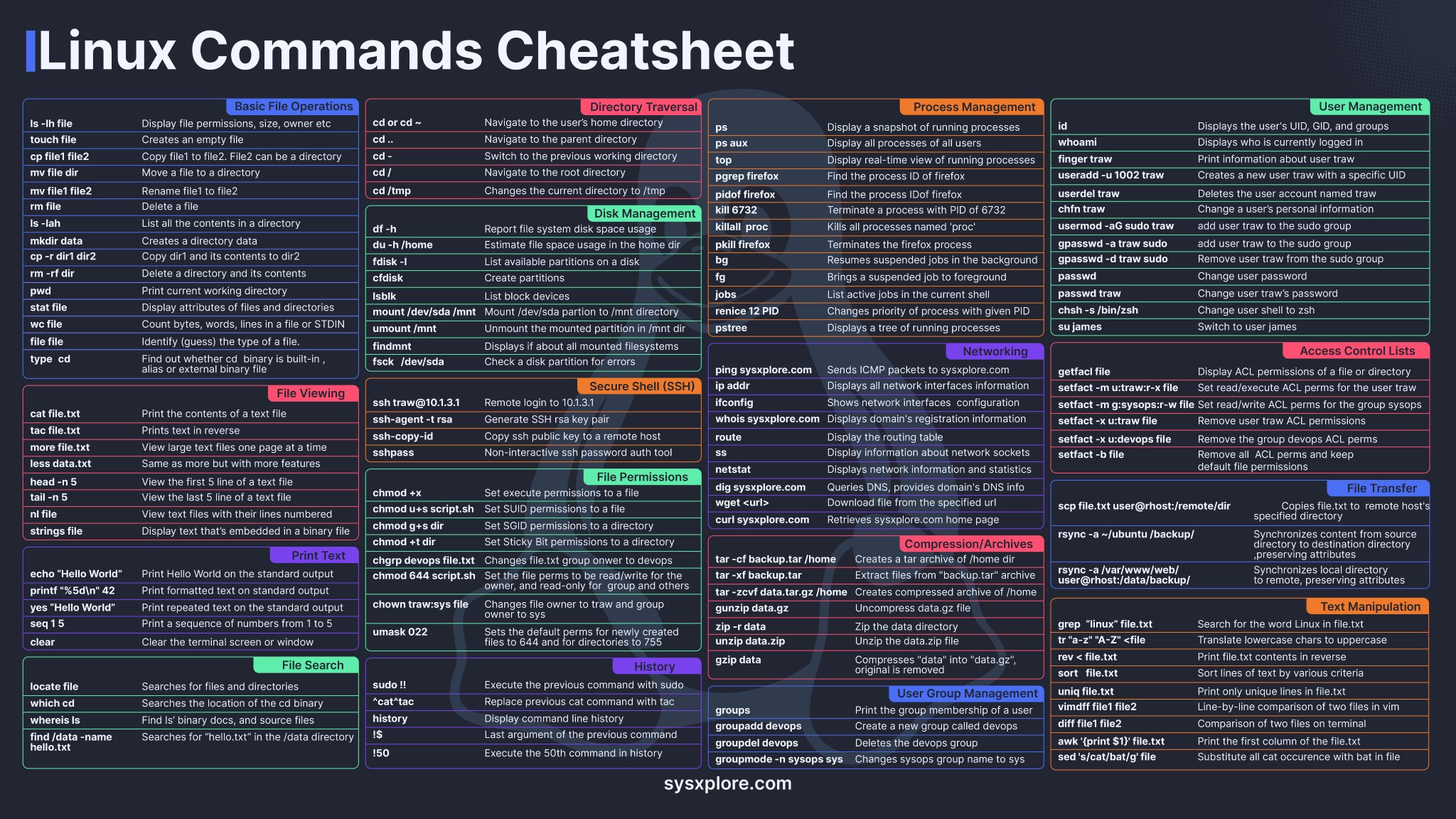I’m a Windows user of all life. But I love Linux. And these last two years after so many time I started learning it in deep . But one thing is bugging me is that I am those persons that has bad times remembering names, words… imagine commands… Even after using it so much I remember some basics but I’m struggling a lot and I have to go back to notes constantly to do some basic operations. Even worst after trying multiple distro from from different upstreams that commands are … Different. What would be your recommendations to help me. Are there tools to help this issue ? My guess is that A LOT of people happens the same. And it’s one of the reasons Linux has such a slow adption . Because is excellent and full of capabilities.
Idea 1:
Print out some of the various CLI cheat sheets and pin them to your wall by where you work on your computer.
Maybe this one:

Then, print a page with commands you commonly use, either with more complex syntax or that aren’t on the sheet. (Like, “ls” is on there, but “ls -s -h” is not, for example.
Idea 2:
Write bash scripts to automate some of your commonly used tasks. Comment them. Imagine someone else is going to have to use them, even if you’re the only one who’s ever going to look at them. Not only will this help you learn lots of commands and force you to describe what they do (which will help you retain the information), it will be there as a record of how it works that you can go back and look at months or years later, to remind yourself how to do something.
Yes, write automation. This will lead you to learning new commands that solve problems as you go. Debugging until they work correctly also helps make them more familiar. This is the best way to learn for sure. At least in my own experience, could be different for you, but I strongly suspect this’ll work well.
I think 90% of the comments here are “write your own notes“ - which is possibly over simplistic.
Everyone’s different but IMHO:
The brain is better for imagination than long term storage. So if you’re stuck trying to remember some obscure command(s), it’s just better to use something else to store that on.
But when the brain understands the core concepts well enough, the details come together as habits (where repetition comes in).
So, if you’re unable to recall something, take some time to think / remind yourself about the underlying concepts and why that’s the command - next time it’ll be easier, eventually it’ll be effortless.
I had to learn some strange concepts for work during a deep technical troubleshooting session on a client’s system and the commands were like just facemashing the keyboard… I’ve no idea what those commands are now (written down), but I can recall what / why I was doing them and that was the key… for me.
(Using computers since '80s)
But when the brain understands the core concepts well enough, the details come together as habits (where repetition comes in). This is the way. Understanding core subjects then is easier to connect and recall stuff.
deleted
history | grep whateveris quite useful when you just barely remember a command or the files you used it on.
strg + r
It happens to you, to me and to every UNIX user since the 70s. Your system is (or should be) full of docs and tools to get help. One thing that I noted over the years, when we have new people at work, is that they don’t known how to get help from programs or they don’t known how to get help from their systems and when they struggle with anything, doesn’t matter how basic, they go to the web for help. I always show them this:
aproposmanhelpWhat was that command to compress files?
apropos compressOh! it was gzipWhat was that command to do whatever with the GRUB?
apropos grubOh yeah! update-grubWhat about that command to download files?
apropos downloadOh! it’s wgetThe next tip should be learn how to use and navigate in the
manpages, man have it’s own man page;man manThere are different sections, section 1 is the default, you don’t need to specify, so you can just;
man bashBut if you want to get help from configuration files you should type;
man 5 sysctl.confAlso, almost every program have a built in help compiled with the program code, you usually call it with --help or -h, sometimes just help and other times just call the program without parameters and it should print it.
Other people already suggest the cheat sheets, very useful especially for programas like vim or emacs, some of them come like a template to create a cube, so you print it and then craft it (like an origami) and you can have it in your physical desktop.
Last thing; be patience, your are in the rigth path, there’s always more than one way to do things, you just need to find your own way.
I made a comment about how easy it was to learn VMS was (an 80s/90s OS). How do I print a file? I’ll try PRINT. Okay, that works. How do I make 6 copies? PRINT /COPIES=6. Great! But how do I print to a file? I’ll try PRINT /OUTPUT=filename. Well whaddya know!
I loved that OS like a brother. Sadly it eventually went the way of every proprietary system.
deleted by creator
Fish
What does Fish that Bash does not, specifically to help the person remembering the program names and options??
It automatically suggests commands, you’ve run before, if you start typing the first letters, like so:

You can also press the Up-Arrow at any point to show other commands from your history which contain the text that you just typed.
So, it is similar to Ctrl+R in Bash, but easier to use and you don’t have to actively think about it.
And, if you can’t remember the options for commands, fish will offer you suggestions. So, if you type
ls -and press tab, fish will give you a list of all of the valid switches and a brief description.
How often do you need commands you cant remember? The ones i use are typically memorized via regular use, or i just look it up for the one off ones. You can use some distros without ever touching the terminal too if thats what you prefer.
Just create aliases with words you’ll remember. Fart, Fart2, ect.
There’s nothing wrong with notes. I keep a text file open permanently at work and home with all my notes in it. I have a bunch of commands in it to copy-paste. Or Ctrl+r and type to search the history.
But if you want to memorize, I usually use flash cards.
Install Thefuck to help when you screw up commands.
If it’s basic commands, there’s games like Terminal Quest that can help gamify your learning. Helped me.
I keep bash scripts on my desktop to do common things
tealdeer and writing them down in a document
My solutions are:
- Just arrow up until you find the command from last.
- Learn to use CTRL-r and search for old commands.
- Bash completion helps with arguments
- Save stuff in shell scripts









